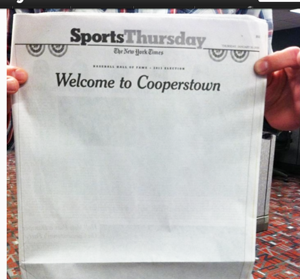By Phil Riske
Managing Editor, Rose Law Group Reporter
 As the son of a football and baseball coach, sports are in my blood. With the news this week all Hall of Fame nominees struck out at the door of baseball’s hallowed hall, the subject of performance enhancing drugs (PEDs) again rises to a high level.
As the son of a football and baseball coach, sports are in my blood. With the news this week all Hall of Fame nominees struck out at the door of baseball’s hallowed hall, the subject of performance enhancing drugs (PEDs) again rises to a high level.
We have previously examined issues regarding medical marijuana patients in the workplace and personnel rules in that regard.
So, I got to wondering if multi-million-dollar baseball players, with their guaranteed contracts and union bargaining rights that make them business enterprises unto themselves, are, in the legal sense “employees” and, if so, who are their bosses —team owners, team managers or Major League Baseball itself, which has suspended players for using PEDs.
Are players in some gray area in employment law and somehow exempt from certain workplace rules?
I turned to attorney David Weissman, who heads up RLG’s Employment Law and Managed Health Care Law Practice for his take.
“If we’re talking about professional baseball players, football players etc. who are involved with team sports, then I would argue that they are, from a legal perspective, employees (as opposed to pro athletes who compete in individual sports like golfers and tennis players, for example),” he wrote.
“The legal determination of whether or not one is an employee comes down to the right to direct and control the details of the worker’s activities. Because team sport athletes are generally subject to the direction and control of an owner, manager, trainer, coach, captain etc., I’d say they are legally employees.
“As for who is their employer, you correctly point out that there is an interesting and somewhat complicated dynamic between the player’s team, the league and the union. I believe that players are first and foremost employees of their individual teams, which are part of and subject to the rules of the association to which they belong, i.e., the league. As a result, if the association has a set of rules in place related to PEDs, the players are subject to those rules.
“Of course, the actions the league or an individual team can take against a player for violating those rules are subject to the provisions of the collectively bargained union contract.
As for the [Hall of Fame] vote, I think it’s unfortunate that players who never tested positive or have never even been accused of using PEDs were swept up in the “anti-PED” vote and denied entry on this year’s ballot. That said, the writers have the discretion to vote any way they want, and if they decided collectively to send a message that players suspected of using (and who we all know used) PEDs don’t belong in the [Hall of Fame], that was perfectly within their rights.”
Weissman said he has a friend who is a former baseball writer and has a lifetime Baseball Hall of Fame vote, and the friend made the following comments about the results of this year’s vote:
“Nobody had more power to eliminate steroid use among players than the biggest stars. Even those who did not use — if there actually are any — are complicit in the serious crime of not acting against PEDs. They will keep all their stats and money, but [Hall of Fame] induction is an honor, not a right, and I don’t think guys who were so criminally negligent are deserving of the highest honor.”
“As a baseball fan, I can’t say that I disagree with him on that,” Weissman concluded.











